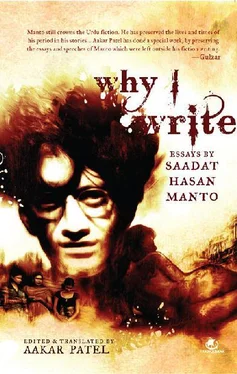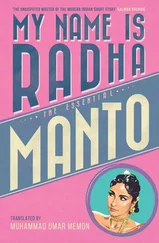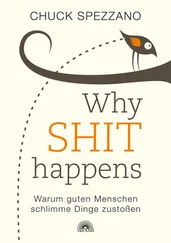I ran to get Mr Hafiz and Mr Irani gave us the names of a few shops. He wrote something on a chit and said: ‘Take Munshi Manto with you and get him whatever he needs.’
We set off in a car and came to a market. Here I picked out a couple of saris. These were debited to Mr Irani’s personal account. Next stop was the jeweller’s. Here an assistant was sent with me, because I had wanted the girl to choose her wedding ornaments herself. We reached Jaffer House. The girl’s mother, whom I called Aunty, was shown the ornaments by the jeweller’s man. She picked out a diamond ring, a pair of pearl earrings, a pendant and some bangles. I pleaded with her to take more, but she didn’t want it to be an expensive deal for me.
I wish I had said to her: ‘Aunty, such an opportunity will not come again. They owe me one and a half thousand rupees.’
Unfortunately, I didn’t and all of this came to only four or five hundred rupees. I never got the rest, and a few days later, the company folded up. Now Mr Nazir, in whose magazine Musawwar I worked, doubled my salary back to forty rupees. This was a relief, and I could continue downing that bottle of beer every evening (which was important).
I began to suspect that this wedding was ill-omened. I had no support in getting it organized. I neither had friends in Bombay nor loved ones. I had a sister here, true, but I was forbidden from even entering her house. I had to do all the work for the event myself. People had to be invited, stuff had to be bought — not to forget that I needed a haircut.
But I was at it. One day, as I was returning after giving the wedding invitation to Syed Fazal Shah, owner of Shah Jahan Mahal Hotel, I slipped and fell on some stones. I fell so hard and hurt myself so badly that I fainted. Now I’ve fainted only three times in my life. This was the first time. The second time was on hearing the news of my mother’s death. The third when my son died.
This falling and fainting was certainly not a good sign and I was convinced now that the wedding was going to be a disaster.
Anyway, I bought what was needed from the market, and reached Jaffer House for the nikah. My body sang out in pain as I climbed up the stairs to their flat and entered a totally different atmosphere, a festive place.
There were fifteen to twenty people at Jaffer House when I reached there for the ceremony. I sat down with the support of a cushion. I couldn’t bend my injured leg and so sat with it extended, and I accept it was very bad manners.
When Qazi Markhe (yes, I thought it was a weird name too) asked me to sit in the formal fashion, I swallowed my pain and knelt as prescribed for Muslims. When the ritual was over, I was relieved and straightened my leg immediately, with waves of pain shooting through it. I accepted the congratulations and limped my way back home.
I lit a kerosene lamp in my chawl and, lying on the bug-infested bed, began to marvel at the fact that I was married now. It’s true that my wife was still absent from this nine-rupee-a-month dump that I called home. But legally, I could ask her to move in with me and there was something to be said for that.
I dared not ask her, of course. What would I feed her — the stuff I got from the Irani nearby (and that too, on credit)? Where would I keep her? This place had neither furniture nor any space to keep it. And where would she bathe? There was no bathroom here. It was a two-storeyed building with forty rooms. For everyone there were only two shared toilets, whose doors had vanished somewhere.
Sooner or later, she would move in with me. Then? How would I play the role of a husband? The thought tormented me.
I had slept with three women before, but they were all maids. We had had sex almost accidentally, two adults with needs, and then moved on, as strangers who brush against one another in a crowded street and soon forget.
I had no experience of treating a lady in the right manner. I was convinced I couldn’t be a husband, a homely man. It wasn’t the same thing as an essayist or a short story writer.
Time went by. I got a job for a hundred rupees a month at Saroj Movietone. I’m convinced the bloody place was waiting for me. I had not been there two months when it folded up.
Then the owner, Seth Nanubhai Desai snared a Marwari and got him to invest in the firm, which was now renamed Hindustan Cinetone. I wrote my second script for this “new” firm, which I called Keechad . This was changed to Apni Nagariya — an awful name, but the movie went on to do well.
While this was going on, one day Mother said that she had announced the date when the bride would be brought home. It had been a year since the wedding, but I had made no preparation for this. My in-laws were impatient and who could blame them? Left to myself, I would have never wanted the day to come.
It wasn’t that I was lazy, I didn’t want the girl to ruin her life and I knew I would be terrible at this married life business. But the day of apocalypse was now at hand.
Meanwhile the paper I was also working part-time, Musawwar had begun to turn in a handsome profit for its owner, Mr Nazir. We moved to a nicer building, to an office with a telephone. Mr Nazir bought himself a little car in which he drove around all day, selling advertising for the paper.
My schedule every Sunday was to go to my in-laws’ in Mahim for a meal, sometimes catching a half-glimpse of my wife, with whom I had never been alone. Later, I hated myself for putting her — and myself — through this, but it was too late to whine.
Ten days before her arrival, I rented a flat in the same building as the Musawwar office. The rent was thirty-five rupees, and my salary from the paper, forty. I told
Mr Nazir to settle the rent directly each month, and that left me with five rupees with which I had to feed myself and my wife. Terrific!
I cleaned up the flat nicely. The floor and the doors were filthy and I gave them a good scrubbing with caustic soda. With hope in my heart and a new-found confidence, I presented myself before Nanubhai Desai. I catalogued to him how much was owed to me for the script and as salary arrears. When in response Nanubhai made it clear that he couldn’t pay me a paisa given his circumstances, I lost it.
I said a few words in anger (and a couple of words of abuse may have slipped out as well). This resulted in my being thrown out physically.
I immediately telephoned Baburao Patel, the editor of Film India . I told him that if Nanubhai did not settle my dues, I would go on a hunger strike.
Now Baburao was aware of my predicament and was disturbed. He called Nanubhai and said: ‘Look, if Manto goes on this hunger strike, the press will unite against you. It’s better to find a solution and resolve this.’
Nothing was solved over the phone, but then Baburao went to meet Nanubhai at his office and I was called in. Nanubhai apologized to me, and I to him. Then it was offered that we settle this with my being paid half of what was owed and letting the other half go, since the company was in dire straits.
I agreed and got a post-dated cheque for nine hundred rupees. When I called Nanubhai a few days later and said I was going to encash it, he told me to come see him before I did so. He told me with a sad face that there was nothing in the bank. Could I not agree to five hundred rupees in cash instead?
I agreed immediately, even though of my hard-earned eighteen hundred rupees, half had already been let go and another four hundred sliced off through this compromise. I was desperate, with only four days left for my bride to come home.
With the cash in my pocket, I took the company car, which had no petrol in it, filled up its tank and went to the market where I bought some saris. I returned home, with my pockets again empty of money. And the flat, of course, was just as empty of furniture. Not even a busted chair in sight.
Читать дальше












